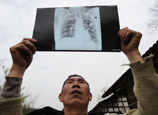
LILONGWE, March 26 (Xinhua) -- Malawi looks forward to another Brightness Campaign from the Chinese government and more Chinese medical teams to support the country's health sector, Malawi government health officials told Xinhua Monday.
The officials said the 2010 Brightness Campaign at Kamuzu Central Hospital (KCH) led by Chinese eye specialist team was very successful that it left behind about 500 cataract patients healed, thereby increasing the country's cataract surgical rate to record high in the year.
Assistant Director of Clinical Services (Ophthalmology), Dr. Michael Masika observed that the exercise "brought in expert hands so the outcome was excellent" hence the need for more.
"We need such exercise again as soon as it can be organized, preferably during the dry season so as to reach to as many people as possible in the villages since some of the areas are difficult to reach during the rainy season," said Masika.
He said eye care in the country faces a lot of challenges such as awareness, poor service due to poor equipment available, distance and cost of getting patients to health facilities for assistance.
He said the 2010 campaign was well coordinated so that with support from other local organizations, patients were ferried from their various remote areas to KCH where there were operated on using high tech equipment brought by the Chinese team.
Masika further appealed to the Chinese government to consider supporting the Malawi's eye care system through human and technical resources.
The senior health official said: "We need support on both short term and long term; on short term, we'd ask for qualified ophthalmologists to work in our hospitals while on long term we would ask the Chinese government to assisting the government in training more Malawian doctors to become ophthalmologist."
"We'd also need assistance in the training of midlevel eye care workers in different fields, and acquisition of eye care equipment, " he said.
In agreement, KCH Chief Ophthalmologist Dr. Joseph Msosa, who worked with the Chinese Brightness Campaign team, recalled the exercise as a very gratifying period in his field.
"It was a very successful exercise because single-handedly, we operate on 30 cataract patients a week. But with the Chinese team we sucessfully operated on close to 500 patients using high-tech equipment – and that was so gratifying," said Dr. Msosa.
He said most cataract patients in the country are the elderly, most of whom live in the villages and very far away from health facilities.
Dr. Msosa, therefore, observed that if there were a permanent outreach program for cataract patients in the country, most elderly people could have been reached.
"Those we manage to assist are the ones who make it to the health centers on their own but those who cannot afford languish in the villages," he explained, adding that the department is donor-dependent and that funds were now lean.
He, therefore, concurred with the Assistant Director of Clinical Services that a huge support in man power and surgical consumables would be very ideal, coupled with a repeat of the 2010 exercise.
According to the health officials, Malawi has an estimated rate of 1 percent blind people from the population of around 14 million.
Eighty percent out of the 140,000 blind people's conditions are preventable, treatable or revisable given appropriate interventions and in time, they said.
Contrary to WHO recommendations of 1 ophthalmologist per every 250,000 - 500,000; 1 ophthalmic clinical Officer per 100,000 - 250, 000, the sub-Saharan country has only 7 ophthalmologists and 46 ophthalmic clinical officers to serve 14 million people.
And while WHO recommends the rate 1 optometrist to 100,000 to 250,000; and 1 ophthalmic Nurse to 100,000 to 250000, the country has only 5 optometrists in public service and 7 in private practice; and no single ophthalmic nurse in service, according to the two senior health officials.
KCH Director Dr. Noor Alide called for support to the health facility's system especially in the area of security.
He said that to enhance maximum security of funds, equipment and drugs, his management was automating the referral health facility's systems hence, need for support in the execution of the ambitious project.
"We came to realize that most of our challenges such as low staffing, drug shortage, insufficient equipment and fraud are man- made," said Alide, "So, while we seek assistance from our partners, we have embarked on automation of the entire hospitals' systems."
















 6 Danes probed for drunkenly urinating on an elevated road in full view
6 Danes probed for drunkenly urinating on an elevated road in full view


![]()
